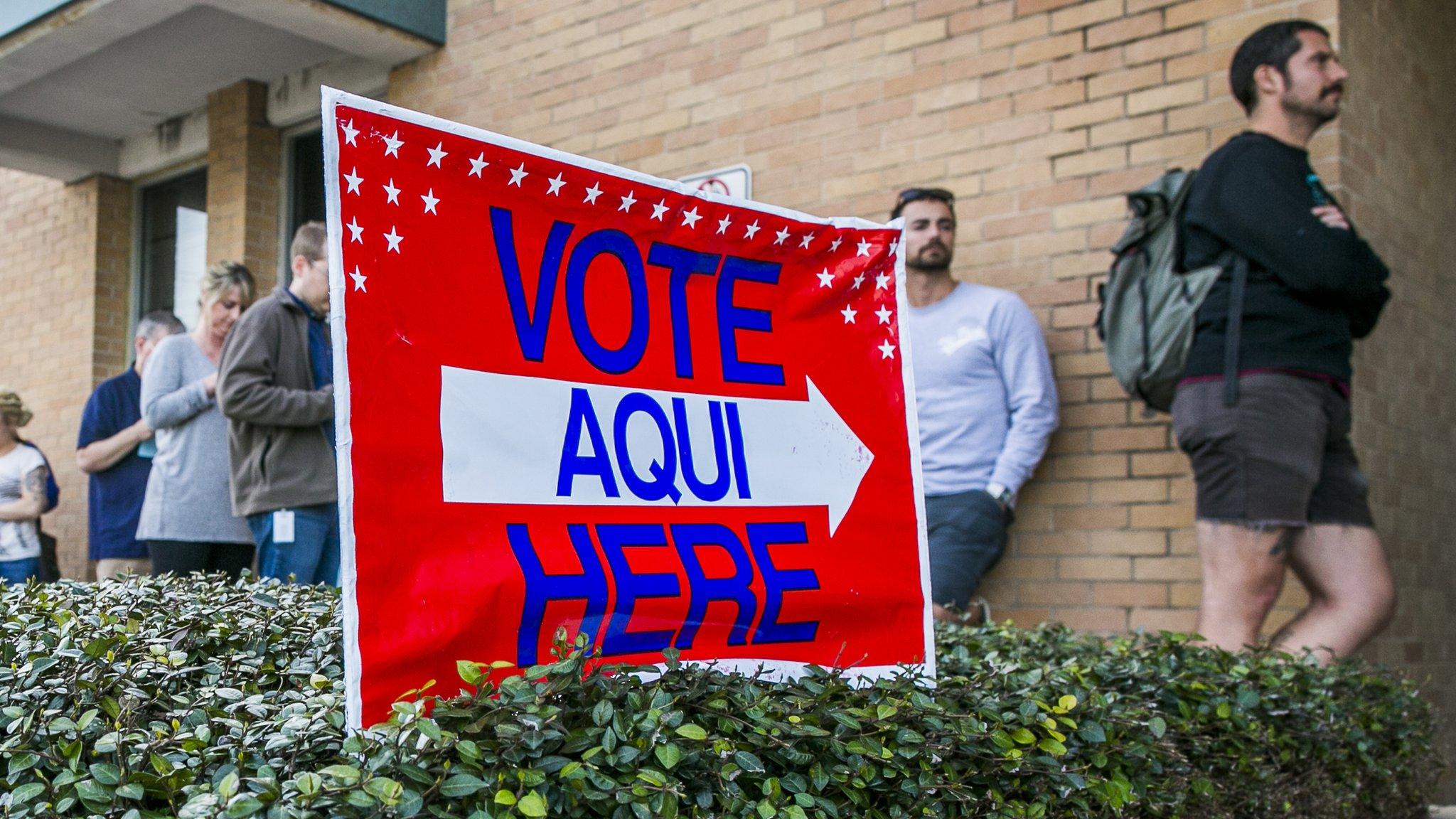An ugly, gloves-off fight that defines US election
- Published
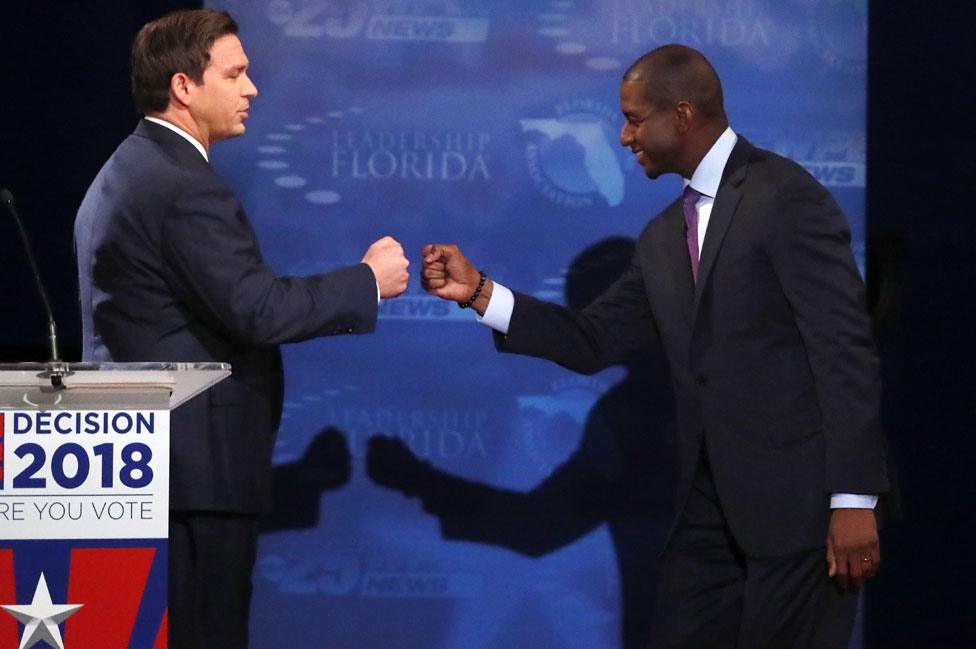
Two candidates who represent the beating hearts of their party's ideological base - a left-wing progressive and a Trumpist conservative - are locked in a brawl that speaks volumes about the first US election campaign in the Trump era.
The Florida governor's race veered toward theatre of the absurd last Wednesday night, following the second debate between Democrat Andrew Gillum and Republican Ron DeSantis at the Miami area's Broward College.
The post-debate "spin-room" - that typically animated media scrum where representatives of the two candidates offer a positive take on their side's performance - devolved into a shouting match.
Republican Congressman Matt Gaetz stood cheek-to-jowl with former Miami Beach Mayor (and recently defeated Democratic governor candidate) Philip Levine, as the volume went up.
"Andrew Gillum was a liar," Gaetz exclaimed.
"We just saw Cassius Clay knock out Sonny Liston!" Levine shouted, reaching back to the famous 1964 heavyweight boxing match in Miami for his comparison of Mr Gillum to Muhammad Ali.
A beautiful look at an ugly race: Sights and sounds from the campaign trail in Florida
If the 2018 Florida governor's race is a prize fight for the top job in the third-largest state in America, the two contestants couldn't offer a more distinct contrast of styles and substance.
Different paths
Andrew Gillum, the 39-year-old mayor of Tallahassee - Florida's capital and seventh-largest city - was a surprise winner in the August Democratic primary, beating Mr Levine and former Congresswoman Gwen Graham (daughter of former Florida Governor and Senator Bob Graham) by 3%.
He campaigned as an avowed progressive, supporting universal government-provided healthcare, increasing public school teacher pay, a $15 minimum wage, marijuana legalisation and dismantling the controversial federal Immigration and Customs Enforcement Agency.
In the past, Florida Democrats have tended to nominate middle-of-the-road candidates for statewide office, banking on the notion that the broadest possible appeal will garner the most votes. With Mr Gillum, they've opted for a different strategy.
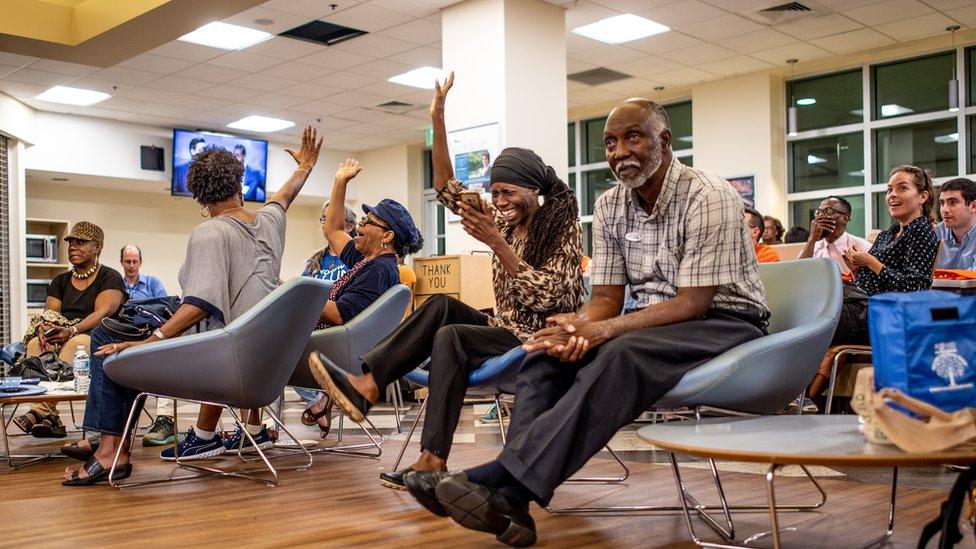
Supporters of Andrew Gillum listen during a recent debate between Mr Gillum and Ron DeSantis
"His message is that we can't continue to conduct Democratic politics the way the state has done," says Khari Pestaina, a graduate student who attended a Gillum rally at Florida International University.
"He's willing to fight, and that's what we need on the left, especially in a state like Florida, which owes so much to its people who put in the work day in and day out and don't get back much in return."

What you need to know about mid-terms:

If he wins, Mr Gillum would be the first black governor of Florida and only the third elected in US history. His campaign attracted a broad spectrum of young and minority voters - a coalition reminiscent of Barack Obama's winning Florida presidential campaigns - as the 2018 Democratic primary turnout in the state set a record high.
"There's definitely real enthusiasm around Gillum," says Steve Schale, a Florida-based political strategist who served as state director of the Obama 2008 presidential campaign.
"It's unfair to compare him to Obama, but it's enthusiasm I haven't seen a governor's race in a long time. The marriage of things that happened in 2008 is there."
Hang on, what ARE the US 'mid-terms'?
On the other side of the ballot, 40-year-old Mr DeSantis - who represented the eastern Florida congressional district centred around Daytona Beach from 2013 until resigning in September - is trying to recreate Donald Trump's successful 2016 presidential campaign in the state.
Facing off against a more established Republican in his primary, Mr DeSantis touted his close ties to Mr Trump - including an influential presidential endorsement. He frequently defends Mr Trump on cable news shows, his campaign website is chock full of pictures of the then-congressman and the president, and he aired a television advert that featured him teaching his daughter how to "build a wall" out of toy blocks and reading Mr Trump's The Art of the Deal to his infant son.
As the president likes to note, Mr DeSantis is a graduate of Yale University and Harvard Law School and served as a lawyer in the US Navy, including a deployment as the legal adviser to a Seal commando team, where he was awarded a Bronze Star.
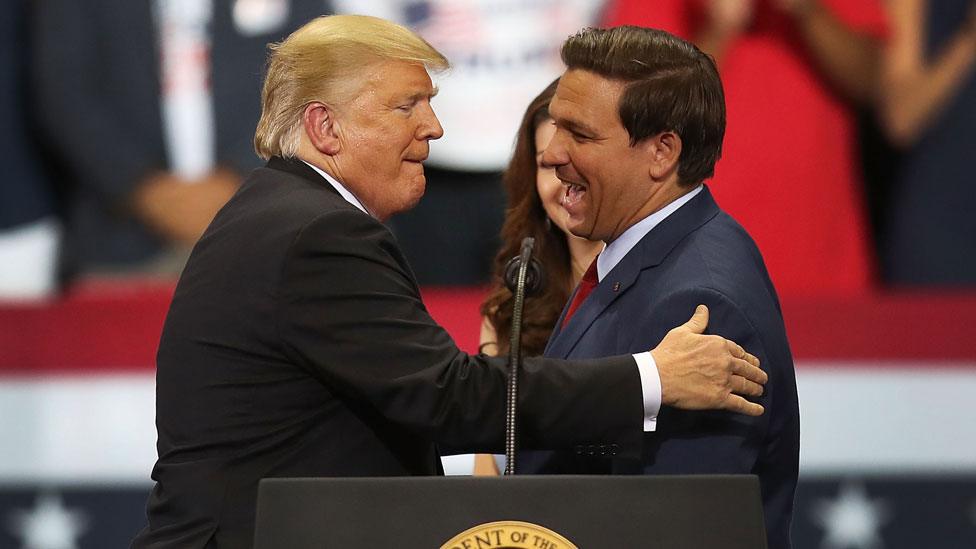
Trump and DeSantis embrace at a rally
"DeSantis has a pretty good record in Congress. He has a pretty good record as a human being," says Steve 'Bubba' Cohen, a former Miami financier and television personality. "This is a guy who, if you were a girl, you would want to bring home to mom."
While in Congress, Mr DeSantis was a member of the Freedom Caucus, the hard-right group of House legislators who frequently bedevilled his own party's leadership by blocking compromises with Democrats and pushing for sharp spending and tax cuts.
Mr Schale says Mr Trump won Florida in 2016 - and helped secure the White House - by flipping suburban and exurban counties in the central part of the state that had in the past opted for Democrats.
"Trump completely changed the map," Mr Schale says. "For DeSantis, his math is to make up for losses among independents, blacks and Hispanics by really just leaning in as hard as humanly possible to his position as the Trump backer."
Given that Republicans have controlled the Florida governor's office for 20 years, his campaign has focused on sustaining the state's currently robust economy, limiting undocumented migration, crime prevention and warnings of financial misfortune if voters opt for a progressive Democrat to lead the state.
A state divided
Within the confines of Broward College, as the two candidates prepared for their debate, the stark contrast between the two candidates left some undecided students torn.
"Both candidates are polar opposites of each other," says Rahjanni Lusi, a 32-year-old former military enlistee. "I like to see a little bit of common ground because at least we would know there's one issue that we can all move forward with."
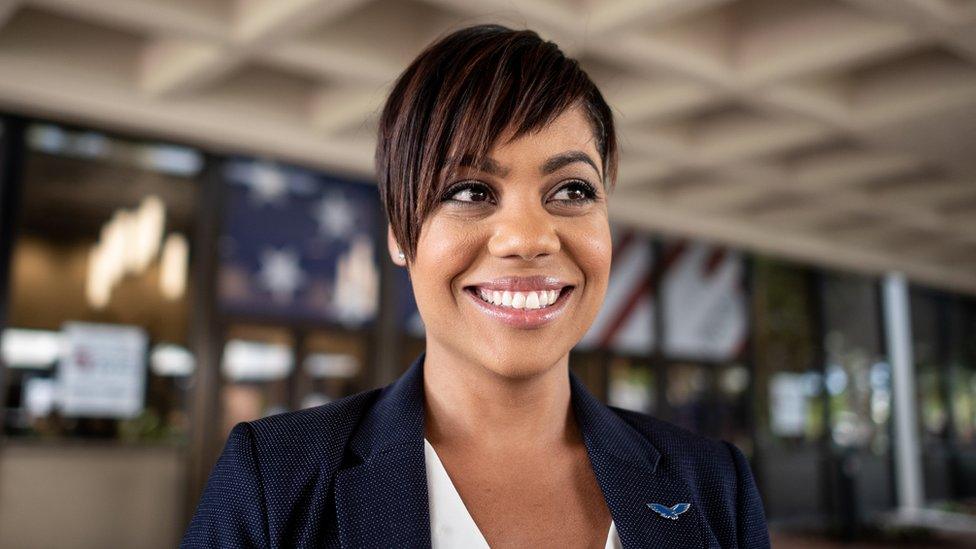
Rahjanni Lusi
Outside of campus, in a grassy area near the main entrance, common ground was hard to find.
In one area, a knot of a few dozen DeSantis supporters, decked out in red, white and blue and carrying a mix of homemade and official campaign signs, chanted "We want Ron!" and "USA! USA!".
One sign warned that Mr Gillum would turn Florida into Venezuela - the socialist dictatorship that has become the bogeyman of many on the right, including the president himself.
Another said "Fake News, Fake Bombs" - a reference to what was then the ongoing rash of pipe bombs delivered to Democratic politicians and supporters across the US. (Two days later, Cesar Sayoc- an avid Trump supporter - would be arrested for the crimes just a few miles from the debate site.)
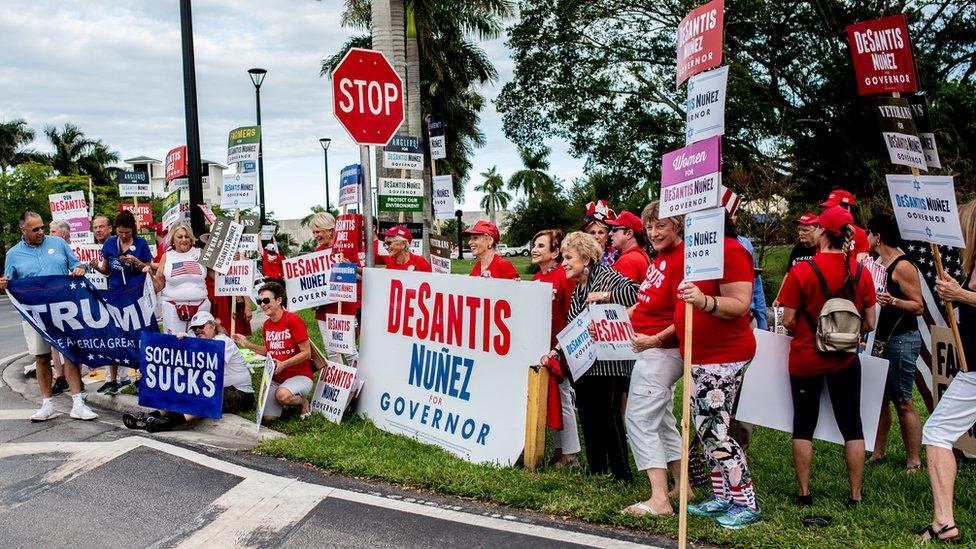
Supporters of Ron DeSantis rally before a debate in Miami
An electronic billboard truck circled nearby, blaring patriotic songs and rotating a glossy photo of Mr DeSantis, a less flattering one of Mr Gillum and, for good measure, a photoshopped image of Hillary Clinton behind bars.
"We will lose everything if Gillum gets in," warned Medora Reading, a former small-business owner from Stuart - a town about two hours up the Florida coast - and now full-time conservative activist.
She says Mr Gillum has made a mess of Tallahassee and is a "pawn" for deep-pocketed liberal donor George Soros (one of the people targeted by the bomber).
The billionaire financier and philanthropist has become a divisive figure in global politics in recent years
Linda Stoch, an interior designer from Palm Beach who organised the pro-DeSantis rally and made the Venezuela sign, echoes that sentiment.
"I don't want to take the future away from my children and grandchildren," she says. "And Andrew Gillum will do that. The stakes are that high."
As the DeSantis supporters marched toward where more media were gathered, pro-Gillum activists began to gather.
The truck's "God Bless the USA" was drowned by hip-hop, and the gloomy predictions of a future with Gillum were replaced with a darker view of the current state of affairs - and hope for a change of fortune.
"Things are going great for wealthy people," says Natalia Perez Santos of For Our Future Florida, the liberal activist group that put together the Gillum rally.
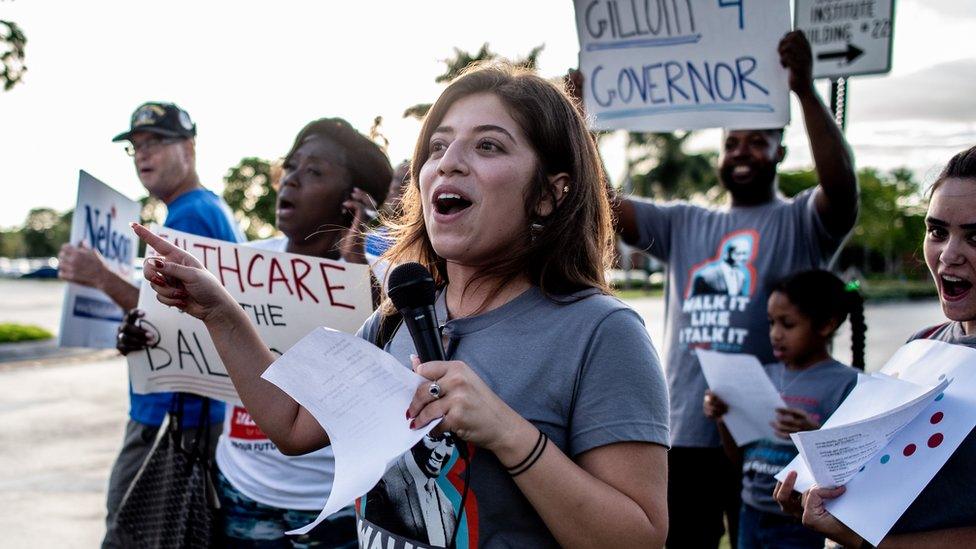
Natalia Perez Santos
"They're not going great for the average working family. Florida actually is the second-worst state for economic inequality, only behind New York."
Mr Gillum, she adds, is talking about issues people care about. "He's someone who is really able to articulate well what he would do to help families."
Trump's shadow
Edward Leuchs, a retired schoolteacher at the pre-debate demonstration, has been canvassing voters in southern Florida - typically a bastion for Democrats - and says some aren't fully engaged yet, but they're getting there.
"There are a lot of low-information voters who don't understand the difference between Democrats and Republicans," he says. "And when you say Trump is a Republican, they know they're Democrats."
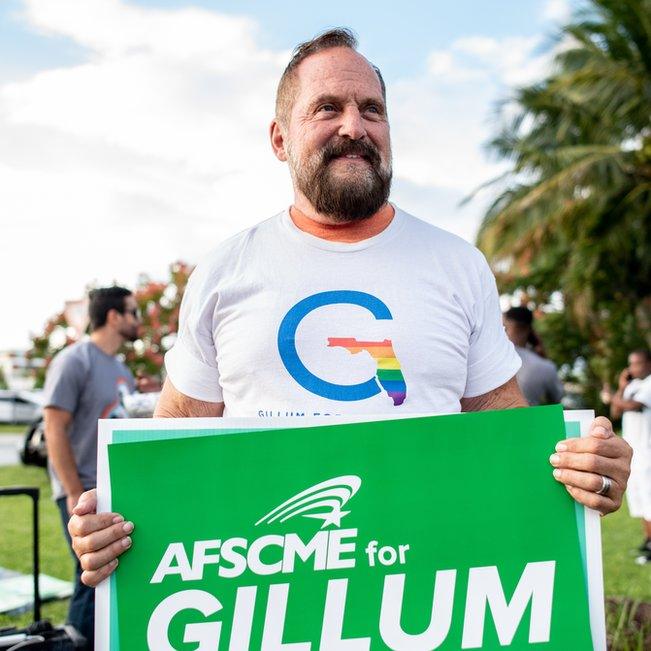
Edward Leuchs
Among the DeSantis supporters, on the other hand, the affinity for Mr Trump is overflowing.
"I love Donald Trump," says Ms Reading. "I am so amazed at what that man has been able to achieve with the Hollywood idiots, with the Clintons, the Democrat Party and the Republican Rinos (Republicans in Name Only)."
The president's presence looms over all of American politics, but his shadow is particularly long in the Florida gubernatorial race.
Mr DeSantis's ties are clear, but Mr Gillum has in part defined himself by his differences with the businessman-turned-commander-in-chief. He's repeatedly called for Mr Trump's impeachment and removal from office - a fact that became a topic of animated discussion in the first candidate debate.

Elsewhere in the US

"You need to be able to work with the president, and Andrew can't do that," Mr DeSantis said. "I think I will be better positioned to advance Florida's priorities because I have a productive relationship with the administration."
Gillum countered: "This is not Russia. You shouldn't have to kiss the ring of the president of the United States for the president to see to the goodwill of the third largest state in all of America."
Early voting started in Florida more than a week ago, and both candidates are criss-crossing the state in public events and rallies. Time and again, the subject of the president comes up.
"Anybody who is a Trump supporter or follower who doesn't have the backbone to stand alone and speak out against his bizarre pronouncements and ideas, I don't want to be governor of any state, let alone Florida," says Carol Reiter, a retired schoolteacher who cast her ballot at a public library in the toney Miami Suburb of Coral Gables.
She says she likes Mr Gillum, but the opportunity to "stick a finger in Trump's eye" is just frosting on the cake.
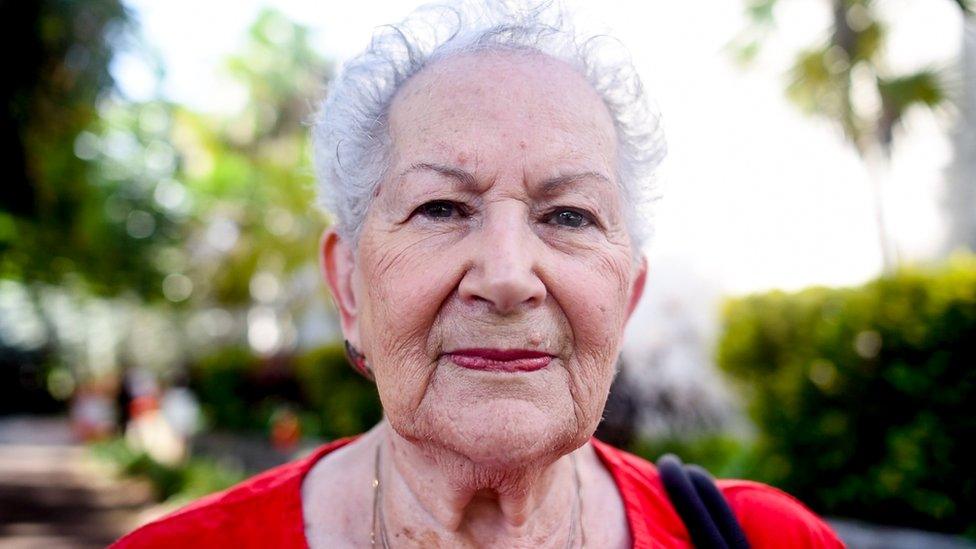
Carol Reiter
Pauline Sholk, a retiree who voted at a public library in Aventura - a strip-mall laden area north of Miami - calls Mr Trump a "terrible person".
"There's no ethics," she says. "There's no honour. Anything that my parents taught me, he does not have."
At a DeSantis pro-Israel rally at a bagel shop near that Aventura library, film producer Hera Becker of Fort Lauderdale has a different view.
"I think Donald Trump is doing a fantastic job," she says. "We need co-operation from the federal government, and I don't see Mayor Gillum being able to do that."
Stephen Fiske, who runs a pro-Israel political action committee, also loves Mr Trump's accomplishments - but has some reservations about the man.

What are the issues at stake?

"Do I appreciate all the tweets, his demeanour, his mannerisms? No. However, the results are the results - and all the rest are noise."
On Wednesday night, the president held a rally for Mr DeSantis and other Florida Republicans in the Gulf Coast town of Fort Meyer. He'll return to the state, up north in Pensacola, on Saturday - one of only two states in which he's making multiple stops.
Most of the destinations in Mr Trump's last-minute national barnstorming tour are deeply conservative states where incumbent Democratic senators are on the ropes. Sharply divided Florida is different.
For the president, who refers to his private club in Palm Beach as the "Southern White House", Florida - and the governor's race in particular - is personal.
Corruption and race
One of the ways the president has injected himself into the governor's election is by repeatedly calling Mr Gillum a "thief" and contrasting him with "Harvard/Yale educated" DeSantis. (Mr Gillum went to Florida A&M University).
The president is referencing allegations that as mayor Mr Gillum improperly took benefits from individuals with business before the Tallahassee government, including accepting a ticket to the Broadway musical Hamilton from an undercover FBI agent investigating corruption in the city.
At Mr Trump's Fort Myers rally, the crowd responded to mention of the Democrat by chanting "lock him up!"
Mr Gillum denies the accusations and says he is not under FBI investigation - and the president provided no evidence to support his accusation of theft.
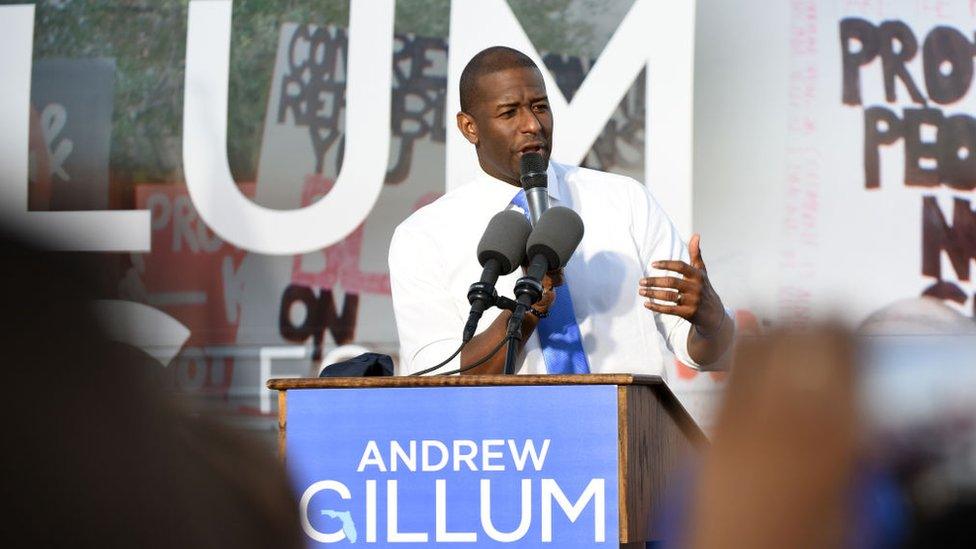
Instead, Mr Gillum and his supporters allege that Mr Trump's statements are thinly veiled racism.
It was perhaps inevitable that race would become a factor in the governor's contest given the ground-breaking nature of Mr Gillum's campaign, but it became an issue long before the president's tweets.
The day after the Florida primary, Mr DeSantis said during a Fox News interview that Florida voters should not "monkey up" the state's economy by electing a Democrat who supports tax increases and a "socialist agenda".
Mr DeSantis also declined to return a campaign donation from a conservative activist who once called President Obama a racist slur. He also spoke at a 2012 conference organised by a different right-wing activist who said that blacks owe their freedom to white people.
"How the hell am I supposed to know every single statement someone makes?" Mr DeSantis said when the subject was brought up during the second debate.
"I'm not calling Mr DeSantis a racist," Mr Gillum quickly countered. "I'm simply saying the racists believe he's a racist."
History in the making?
Black voters make up 16% of Florida's population - and their turnout could be pivotal to Mr Gillum's campaign. Black people support Democrats in overwhelming numbers and, in 2012, 74% participated in the presidential election. In 2016, that number dropped to 65% - a decline that contributed to Hillary Clinton's narrow defeat.
In mid-terms, the numbers are even lower. In 2014 42% voted, while in 2010 - a wave election for Republicans nationwide - 33% cast ballots.
In heavily black Miami-Dade County, early voting turnout is already up more than 160% from 2014, and Mr Gillum could be the reason. Recent opinion polls show Mr Gillum with a small but steady lead - playing in to the candidate's constant exhortations that his voters can prevail if they "bring it home".
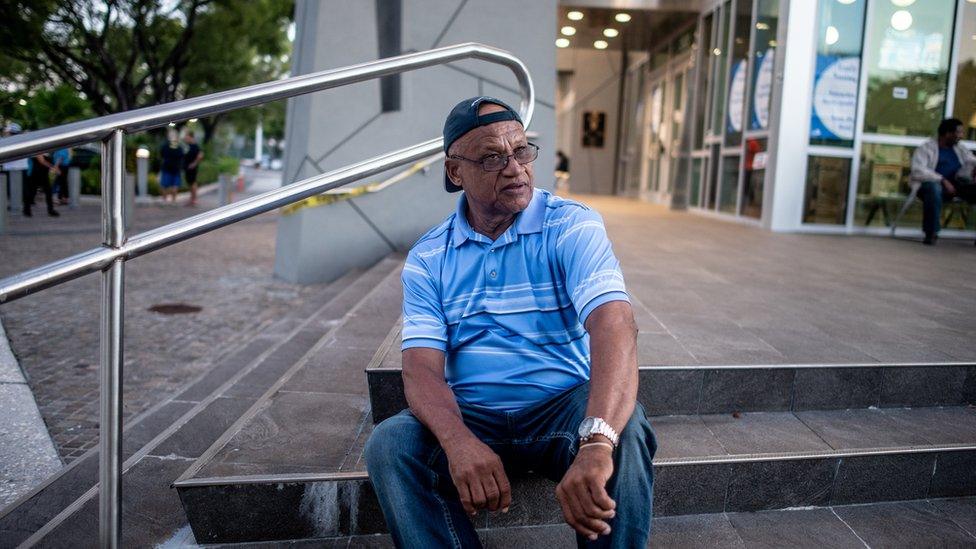
Jean Louis
Jean Louis walked out of the Aventura public library and into the balmy south Florida evening after casting his ballot for Mr Gillum last week. He notes that 28 August was a historic day in American history - when Martin Luther King Jr gave his 1963 "I have a dream" speech in Washington, Mr Obama received the presidential nomination at the Democratic National Convention in 2008 and the night Mr Gillum secured the governor's nomination earlier this year.
He says he feels Andrew Gillum is the man for the hour in Florida.
"It will give me goosebumps to see the first black governor here," he says with a smile.
If Mr Gillum wins, however, it won't have been without a fight.
Video and uncredited photos by Hannah Long-Higgins
.
Related topics
- Published1 November 2018
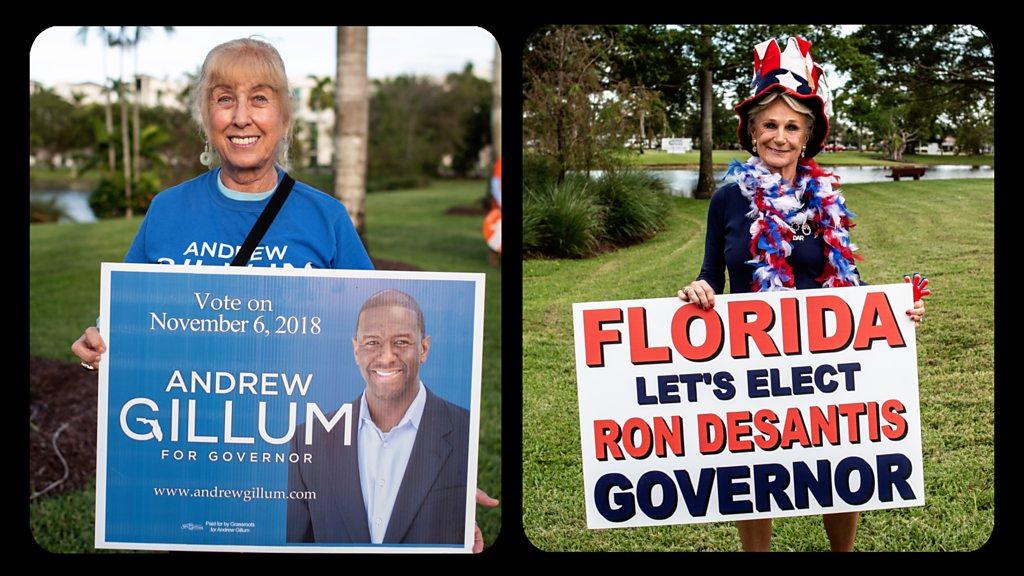
- Published6 November 2018
